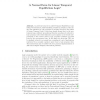383 search results - page 41 / 77 » Formal Syntax and Semantics of Case Stacking Languages |
193
click to vote
POPL
2007
ACM
16 years 5 days ago
2007
ACM
This paper is concerned with a programming language construct for typed name binding that enforces -equivalence. It proves a new result about what operations on names can co-exist...
114
click to vote
JELIA
2010
Springer
14 years 10 months ago
2010
Springer
In previous work, the so-called Temporal Equilibrium Logic (TEL) was introduced. This formalism provides an extension of the Answer Set semantics for logic programs to arbirary the...
CN
2002
14 years 11 months ago
2002
XML is a now a dominant standard for storing and exchanging information. With its increasing use in areas such as data warehousing and e-commerce, there is a rapidly growing need ...
CORR
2010
Springer
14 years 12 months ago
2010
Springer
Abstract. Orc is a theory of orchestration of services that allows structured programming of distributed and timed computations. Several formal semantics have been proposed for Orc...
106
click to vote
JLP
2010
14 years 6 months ago
2010
K is an executable semantic framework in which programming languages, calculi, as well as type systems or formal analysis tools can be defined making use of configurations, comput...

